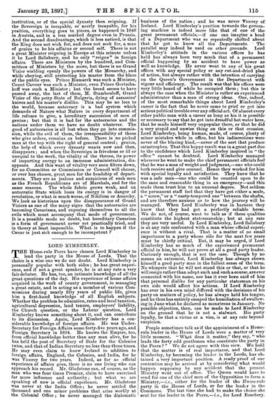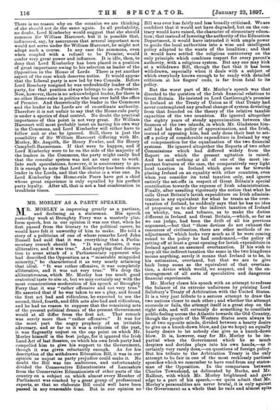LORD KIMBERLEY. T HE Home-rule Peers have chosen Lord Kimberley to
lead the party in the House of Lords. 'That the choice is a wise one we do not doubt. Lord Kimberley is personally popular with both sides ; he has great experi- ence, and if not a great speaker, he is at any rate a very fair debater. He has, too, an intimate knowledge of all the great questions of the day. His experience of home affairs acquired in the work of county government, in managing a. great estate, and in acting as a member of various Com- missions during nearly fifty years of public life, gives him a first-hand knowledge of all English subjects. Whether the problem be education, rates and local taxation, agricultural depression, land tenure, employers' liability, the Cherch question, or. the Labour question, Lord Kimberley knows something about it, and can contribute to its discussion. Again, Lord Kimberley has a con- siderable knowledge of foreign affairs. He was Under- Secretary for Foreign Affairs some forty-five years ago, and Foreign Secretary in 1894. He knows the Empire, too, from official knowledge better than any man alive, for he has held 'the post of Secretary of State for the Colonies twice, and that of Indian Secretary no less than three times. He may even claim to know Ireland in' addition to foreign affairs, England, the Colonies, and India, for he was Viceroy for two years. Indeed, as far' as official experience of affairs goes, there is no one living who can approach his record. Mr. Gladstone can, of course, as the man who was four times Premier, claim to have exercised far more influence and authority ; but what we are speaking of now is official experience. Mr. Gladstone was never at the India Office ; he never settled the thousand and one minor problems that arise weekly at the Colonial Office ; never managed the diplomatic business of the nation ; and be was never Viceroy of Ireland. Lord Kimberley's position towards the govern- ing machine is indeed more like that of one of the great permanent officials,—if one can imagine a head of a Department who was so repeatedly shifted about that he got to know all the Departments. ' The parallel may indeed be used on other grounds. Lord Kimberley's attitude in the various offices he has held has always been very much that of a permanent official happening by an accident to have power as as knowledge. He never went to any of his great offices with any special policy or any cut-and-dried plait- of action, but always rather with the intention of carrying on the Queen's Government in the Department with vigour and efficiency. The result was that his offices were very little heard of while he occupied them ; but this kr always the case when the Minister is rather an experienced administrator than a man of strong ideas. One, indeed,, of the most remarkable things about Lord Kimberley's career is the fact that he never came to grief or got into- serious political trouble over any official act. Of almost every other public man with a career as long as his it is possible or necessary to say that he got into dreadful hot water here,. that he made himself very unpopular there, or that he did a very stupid and unwise thing on this or that occasion. Lord Kimberley, being human, made, of course, plenty of minor mistakes while in office, but his indiscretions were never of the blazing kind,—never of the sort that produce catastrophes. That this happy result was in a great part due- to the confidence which Lord Kimberley inspired in "the office" cannot be doubted. Lord Kimberley managed wherever he went to make the chief permanent officials feel that he was a man of weight and judgment,—one who could' both receive and give counsel. Hence they worked for him with special loyalty and satisfaction. They knew that be was a safe man—one who could be counted upon to do the sane and reasonable thing in an emergency—and this made them trust hiui to an unusual degree. Not seldom. the permanent staff feel that they have got either a mule, a "screw," or a "nasty-tempered one " between the shafts, and are therefore anxious as to how the journey will be Lo managed. When rd Kimberley w i as n harness they knew that they had got a perfectly reliable horse. We do not, of course, want to talk as if these qualities constitute the highest statesmanship ; but at any rate they are very useful. In Lord Kimberley, Lord Salisbury is at any rate confronted with a man whose official experi- ence is without a rival. That is a matter of no small importance to a party whose role for the next few years must be chiefly critical. But, it may be urged, if Lord Kimberley has so much of the experienced permanent official in him, he will not prove at all a good party leader. Curiously enough, that is not the case. Though by no means an extremist, Lord Kimberley has 'always shown himself a good party man in the fullest sense of the term. No whispers that he will not stand this or that, or that he will resign rather than adopt such and such a eourse, are ever connected with his name, nor has it ever been said of him that personal dislike for any particular statesman on his own side would affect his actions. If Lord Kimberley has ever in his own mind differed with the decisions of his party on matters of policy, he has always held his tongue, and he thus has entirely escaped the humiliation of swallow- ing in June what he declared as monstrous in January. No possible objection, then, can be made to Lord Kimberley on the ground that he is not a stalwart. His party loyalty, be that a virtue or a vice, is at any rate beyond suspicion.
People sometimes talk as if the appointment of a Home- rule leader in the House of Lords were a matter of very little moment. "What does it matter," they say, " who- leads the forty odd gentlemen who constitute the party in the Peers ? " We do not agree with this view. We hold that the matter is of real importance, and that Lord Kimberley, by becoming the leader in the Lords, has ob- tained a very important position. A ready proof of our contention may be arrived at by considering what would happen supposing by any accident that the present Ministry went out of office. The Queen would have to send for one of the chief men of the Opposition to form a Ministry,—i.e. either for the leader of the Home-rule party in the House of Lords, Or for the leader in the Commons. The last time she had lo make the choice she sent for the leader in the Peers,—i.e., for Lord Rosebery. There is no reason why on the occasion we are thinking of she should not do the same again. In all probability, no doubt, Lord Kimberley would suggest that she should summon Sir William Harcourt, but it is possible that, influenced, say, by assurances that several important men would not serve under Sir William Harcourt, he might not adopt such a course. In any case the summons, even when coupled with a refusal to be Premier, would confer very great power and influence. It is idle, then, to deny that Lord Kimberley has been placed in a position of great importance owing to his selection as leader of the opposition in the House of Lords- There is yet another aspect of the case which deserves notice. It would appear that the Liberal party is now led by two Consuls. Before Lord Rosebery resigned he was undoubtedly leader of the party, for that position always belongs to an ex-Premier. Now, however, there is no acknowledged leader, for there is no other Home-ruler in politics who has ever held the office of Premier. And theoretically the leader in the Commons and the leader in the Lords are of co-ordinate authority. Therefore it is not unfair to say that the Home-rule party is under a species of dual control. No doubt the practical importance of this point is not very great. Sir William Harcourt will most probably insist on having his own way in the Commons, and Lord Kimberley will either have to follow suit or else be ignored. Still, there is just the possibility of Sir William Harcourt differing with Mr. Morley, Mr. Asquith, Sir Henry Fowler, and Sir Henry Campbell-Bannerman. If that were to happen, and if Lord Kimberley were to be on the side of the majority of the leaders in the Commons, the party might easily find that the consular system was not an easy one to work. Into such speculations, however, it is unnecessary to go. It is enough to note that Lord Kimberley has been chosen leader in the Lords, and that the choice is a wise one. In Lord Kimberley the Home-rule Peers have got a chief whose great experience is only equalled by his perfect party loyalty. After all, that is not a bad combination in troublous times.



































 Previous page
Previous page